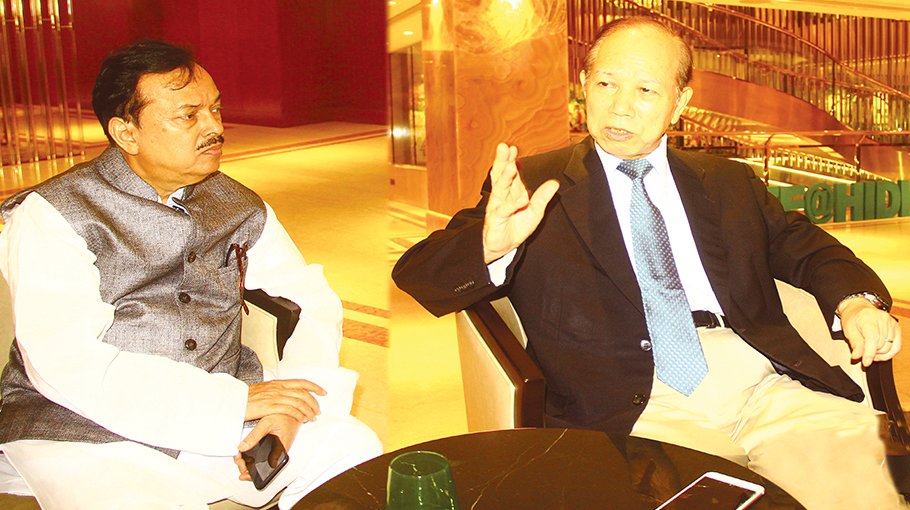Strong political will must for economic development
Says Dr. Kobayashi


Japan Development Initiative (JDI) Chairman Dr. Shoichi Kobayashi is dedicated to create 10 million jobs in Asia, Southeast Asia and West Asian countries.
While talking to the Bangladesh Post, Dr. Kobayashi, former finance minister of Japan, was sharing his long experience. This Japanese economist has been specially assigned to create one million jobs in the 100 Special Economic Zones in Bangladesh, has said that a strong political will is needed in achieving a sustainable development.
Creation of a large number of jobs in Special Economic Zones (SEZs) in Bangladesh will not be difficult if some steps are followed properly, said the Japan Development Initiative.
The Japan Development Initiative (JDI) SEZ Approach ‘100 million Job Creation Plan’ showed that due to the failure in implementing plans with proper vision many SEZs around the world failed to attract foreign direct investment and create employment opportunities.
Since many LDC countries are facing shortage of employment,especially due to the Covid-19 from the year 2000 and Russian-Ukraine war from 2022, the need of ‘Job Creation by SEZ’ seems to be increasing dramatically.
JDI’s plan for ‘100 million job creation plans by SEZ’, therefore, in the coming 15 years to 20 years using the 10 Commandments Approach is likely to help SEZs to create huge jobs in the coming days, according to Dr. Shoichi Kobayashi, JDI Chairman.
These 10 commandments are: Proactive approach, Top-down approach forming an Orchestras, Set-up vision and target, A to Z approach, Trouble Shooting Mechanism (TSM), Long Term Approach, Flexibility Approach, Market Driven Approach, Need Driven Approach, and Transparency Approach.
The recent trend of the global SEZ shows that SEZ programmes have been adopted by 147 countries in the world by 2018 and 5400 SEZs have contributed in the economic development of LDC countries significantly and created nearly 80 million new jobs.
From 1975 to 2018 data show that, during 1975 only 29 countries have established 79 SEZs but in 2018 147 countries established 5400 SEZs. This number is expected to grow further in the future due to higher unemployment caused by COVID-19 and other economic slowdown factors.
The data further showed that 35 percent of the total SEZs are fully or sufficiently utilized while 47 percent of them are underutilized or heavily underutilized. Fully utilized or sufficiently utilized SEZs normally take seven to 10 years for implementation while it may take less time if authorities concerned are conscious about their vision.
SEZs are normally established to achieve various policy objectives such as to attract foreign direct investment (FDI), to generate employment, and to be experimental with economic reforms via zone-exclusive trade policies.
Bangladesh Economic Zones Authority (BEZA) is establishing 100 SEZs, aiming to add 10 million jobs with an export addition of $40 billion by 2030, to encourage rapid economic development through diversification of industries and augmentation of employment, production, and export.
According to BEZA, Bangabandhu Sheikh MujibShilpa Nagar is being built on about 30,000 acres of land in Mirsarai and Sonagaziupazilas of Chattogram district. In Bangabandhu Sheikh MujibShilpa Nagar, Asian Paints Limited has invested USD 26 million, Ramky Enviro Pty Limited has invested USD 10 million and Marico Bangladesh Limited has invested USD 26.72 million. Besides, Sakata Inc. Private Limited has invested USD 2.13 million in Meghna Industrial Economic Zone.
Among the companies, except Marico, all are currently in production.
BEZA executive chairman Shaikh Yusuf Harun earlier said that the factories in BangabandhuShilpashahar and Srihatt areas will go into production immediately. Production has already started in six private economic zones. Factories located in economic zones of Japan and China will also be operational.
According to BEZA's calculations, investment proposals of about USD 1,631 crore dollars have already been received which is equal to Tk 1.37 lakh crore in Bangladeshi currency. Most of these are foreign investments.
Due to the visionary foresight of JDI, it has been able to take a risk of 50 million yen to construct a SEZ in Thailand. It takes normally five to seven years to build a SEZ, but JDI initiatives helped build a SEZ of 140 ha land within 1.5 years and had a huge impact on ASEAN countries and subsequently triggered a huge boom in private sector SEZ development. In 1987, there were only four SEZs in Thailand but due to JDI’s initiative now there are 95 SEZs.
Similarly, with one million job creation JDI visited Jakarta in 1989 and enabled the successful development of a large industrial city. Now Bekasi-Chikaran areas have 8 SEZs and more than 50,000 companies are located with a population of 3.5 million.
Following the successful development of SEZs in Thailand, Malaysia, the Philippines and Indonesia, JDI submited a proposal of 500000 jobs in Cambodia. Now there are 15 SEZs operating across the country and the promised 500,000 new jobs have been successfully created in 2020.
Having all the experience and expertise, JDI has supported the development of private SEZs in three locations following the successful attracting the long-desired Honda motorcycle plant (with a production capacity of 500 000 units) in 2017 at Abdul Monem Economic Zone.
JDI findings showed that Bangladesh’s SEZs are under construction and the real attraction of companies is yet to begin. The impact is expected to surface in the next five years or so.


